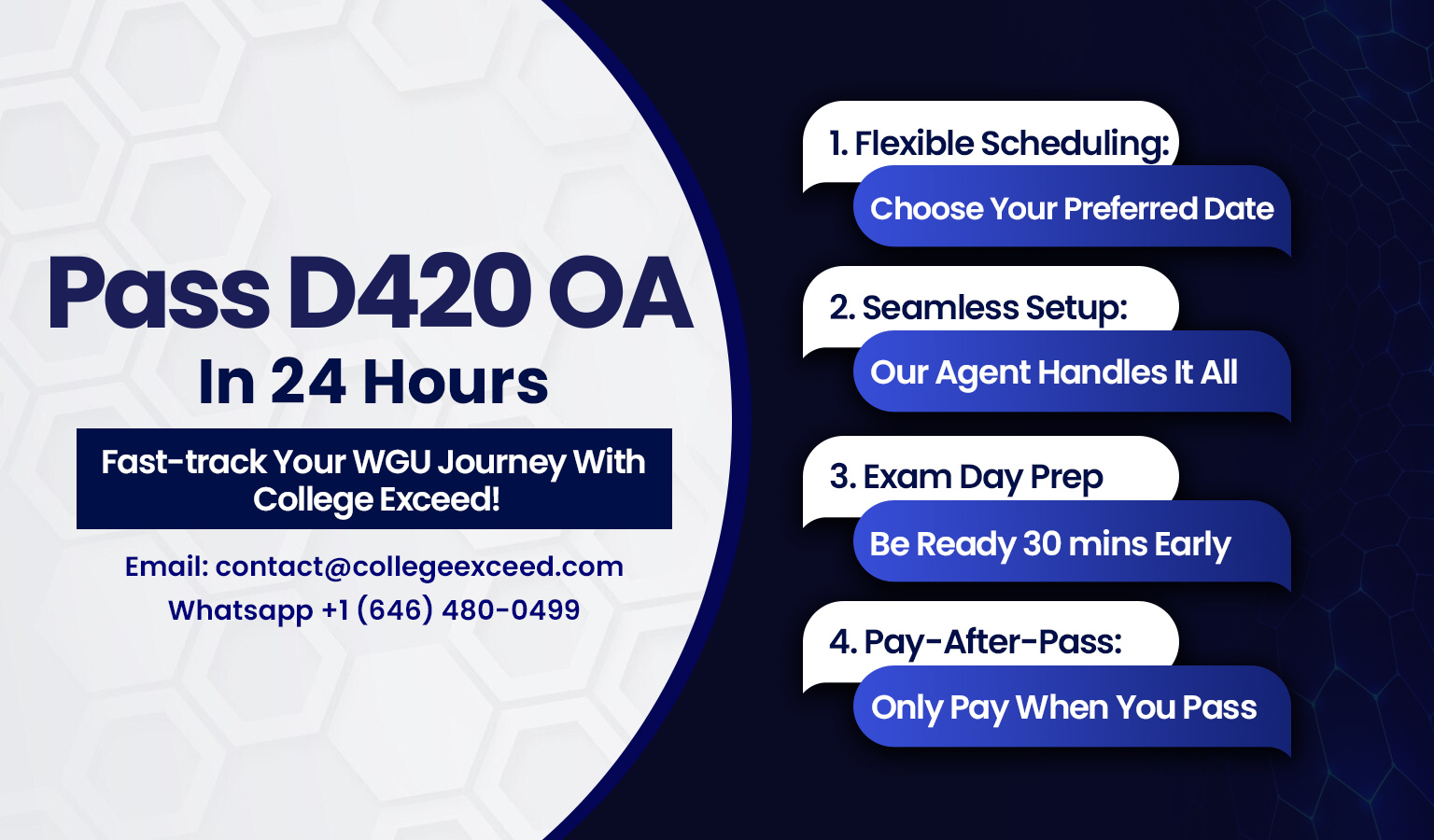Welcome to the world of Discrete Math: Logic WGU D420, which may alarm those who first hear it. But, in fact, with the correct attitude, it is quite easy. If you are a complete beginner in Discrete math: Logic or if you have a little background, this course will introduce you to the core ideas that are used in discrete mathematics. In this article, you will discover everything you ought to know about this class including expectations, and preparation for the final Objective Assessment (OA).
Here’s a quick overview of what we’ll cover in this guide:
- What to Expect from the Module: We will look at the areas of coverage in the course and identify topics that are likely going to be examined closely so that you know where to direct your efforts.
- Study Guide to Pass the OA: This is a weekly study timetable that will assist you in being prepared and recognizing when the OA is due.
- External Resources to Help You Study: Additional resources from the web, that you can use to get additional help in areas you may require assistance.
- Key Tips to Prepare and Ace the OA: Any idea that may appear challenging and difficult to grasp shall be presented in black and white tables, comparisons, and examples.
- FAQ: Questions that come up frequently as students are studying our course shall be addressed here, just in case you do not find the answer you are looking for.
- Conclusion: A few tips before you go on with this laudable course, as you gear up for the fruitful task.
By the end of this article, you’ll have a clear path to follow and the confidence to excel in Discrete Math: Logic D420. Let’s get started!
...
An Overview of WGU D420 Discrete Math: Logic📖
Discrete Math: Logic D420, aims to share with you the problems, rules, procedures, and strategies that will help you face the complex challenges of formal logic, proofs, Boolean Algebra, and functions. However, this course is very basic, especially for those who intend to pursue more detailed sections of computer science and mathematics in the future. It is not just what you write down in your books, it is more about having an understanding of the principles governing the entire process.
Key Areas Covered:
- Logic and Proofs: Another course goal is to increase your capability of writing logical arguments and creating proofs. You will learn how to analyze arguments down to their base, the proper application of logical operators, and the formation of proofs. This is not an academic exercise alone because you will be solving real-life problems based on the concepts, which is an important tool for anyone who wants to be a mathematician or a computer scientist. The emphasis will be placed on the proofs and you will be spending a lot of time in the class reviewing proof techniques which will be on the final assessment.
- Boolean Algebra and Boolean Functions: A parallel critical area in this course is Boolean Algebra which is the foundation of digital logic design, a widely used component of computing. You are also going to meet Boolean functions, and how to operate them algebraically in order to simplify them. It is important that you understand Boolean Algebra, mainly if you intend to work in sectors like software development, electrical engineering, or any sector that has dealings with digital systems. It is also prominently covered in the exams; therefore, it is also important to get acquainted with it.
- Application of Logic in Probability and Statistics: It is important for you to use some of what you learned in Applied Probability and Statistics and Applied Algebra here, which is why they are prerequisites for this course. I have provided brief details about these areas and when you proceed you will understand how logical concepts are incorporated while analyzing statistical data and other probabilistic models. The combination of logic with probability and statistics is therefore not only fascinating from an academic point of view but also more or less useful in a number of occupations depending on how important the handling of larger quantities of data is in this occupation.
Expect to Be Challenged, But Stay Positive:
Despite the difficulty of this course, which indeed is true, this is probably one of the most rewarding courses I have ever taken. You will be challenged to reason out, analyze, and come up with solutions that can help solve some of the existing problems. The skills you acquire from here can be very useful in whichever academic level or your working career. As I have said, the degree of difficulty implies is due to how relevant the course content is – but you are most certainly capable of achieving excellent results if you apply effort and employ the correct study strategies.
In the next section, we will employ a weekly plan of how to approach a study to guarantee a successful preparation for the OA. Stay tuned!
Study Guide for D420 OA Discrete Math: Logic 📝
Passing the Discrete Math: The topics covered in the Logic D420 course can be easily divided into several weeks, this way the study will be more effective, and a person will be prepared well in advance for the OA. Below is a plan for control of time and direction toward one’s study to ensure that one gets the most out of his or her studying process.
Week 1: Take the Pre-Assessment (PA) Blind
- To begin with, attempt the Pre-Assessment (PA) section unpracticed. Of course, this may sound like the beginning of disaster and can make you feel like you are crashing and burning. But that’s perfectly okay! The idea here is to accustom oneself to the type of questions that are posed in the final examination. There is no need to trick or to try to outsmart this step in any shape or form. This is the purpose of trying to obtain a preliminary picture and realize how you fare without it, and which aspects demand the most improvement. Answering a number of questions will reveal that some of these concepts and formats of the questions will be trendy in your mind, which will surely help as you go forward.
Week 2-3: Dive into the Zybook
- After your initial PA experience, it’s time to dive into the Zybook, the primary reading material for this course. Take your time with this; don’t rush through the content. As you read, keep the PA questions in mind. You’ll start to see connections between what you struggled with in the PA and the explanations in the Zybook. Pay special attention to the sections on logic, proofs, and Boolean algebra, as these are heavily tested topics. Take notes, do the practice problems, and ensure you understand the underlying concepts, not just the surface-level details.
Week 4: Watch Kimberly Brehm’s Discrete Math Playlist
- Supplement your reading with some visual learning by watching Kimberly Brehm’s Discrete Math playlist on YouTube. Kimberly Brehm does an excellent job of breaking down complex concepts into easy-to-understand explanations. This will be especially helpful if you’re struggling with any particular topic from the Zybook. Her videos are engaging and concise, making it easier to grasp the material and solidify your understanding. Set aside a few hours each day to go through this playlist, and take notes on anything that seems particularly tricky.
Week 5: Retake the Pre-Assessment (PA)
- Now that you’ve done some substantial studying, it’s time to retake the Pre-Assessment. You should notice a significant improvement in your score. The goal here is to attain a score of more than 85%. This score is a strong indicator that you’re ready for the OA. If you’re still struggling with certain areas, take some extra time to review those specific topics using both the Zybook and Kimberly Brehm’s videos. This second attempt will also boost your confidence, reassuring you that your hard work is paying off.
Week 6: Final Preparations and Take the OA
- When you get yourself a good PA score in the bag, let’s go back to the OA. Give yourself a chance to be fresh and responsive as a worker and a human being as well. Review the notes one more time, and make sure that there is nothing that is still fuzzy. Please, remember, that the OA is intended to check your knowledge of what was studied, not only your ability to memorize something. Take to the questions with the attitude you are applying the knowledge that you have learned and do not panic if a question does not look familiar at first sight. Just trust your preparation and you are sure to excel with flying colors.
This week-by-week plan ensures you build a strong foundation, gain confidence, and are fully prepared to ace the Discrete Math: Logic D420 course. Next up, we’ll explore some external resources that can further support your studies.
...
Top Resources for Mastering Discrete Math: Logic📂
Here are some top free resources to support your study of Discrete Math: Logic D420:
Kimberly Brehm on YouTube
- Link: Kimberly Brehm’s Discrete Math Playlist
- Clear and concise explanations of key concepts in Discrete Math, perfect for reinforcing your learning.
TrevTutor on YouTube
- Link: TrevTutor’s Discrete Math Playlist
- Straightforward lessons with practical examples to help you grasp difficult topics.
Wrath of Math on YouTube
- Link: Wrath of Math YouTube Channel
- Quick, focused videos on various Discrete Math topics—great for quick reviews.
Practice Questions on CompSciLib
- Link: CompSciLib Discrete Math Practice Questions
- A wide range of practice questions to test your understanding and prepare for exams.
Discrete Math Udemy Course
- Link: Discrete Math Udemy Course
- A structured course covering all key topics is useful for deep dives into the material.
These resources will help you strengthen your understanding and tackle challenging concepts in the course. Next, we’ll focus on the key topics to master for success in Discrete Math: Logic D420.
...
D420 OA Preparation Tips for Discrete Math: Logic👨🏻🏫
Preparing for the Objective Assessment (OA) in Discrete Math: Logic D420 requires a strategic approach to ensure you’re ready for every type of question that might come your way. Here’s how you can effectively prepare:
Study All Sections Thoroughly:
- Every section in the course is important, so make sure you cover all the material. Don’t skip any sections, even if they seem challenging or less interesting. Each topic builds on the previous one, and missing out on key concepts could make the OA more difficult. The section summaries provided at the end of each module are particularly useful if you find yourself getting lost in the details but are generally good at math. Use these summaries as quick revision tools before the OA.
Leverage the Pre-Assessment (PA):
- The Pre-Assessment is your best friend when it comes to understanding the structure and format of the OA. Take the PA early in your study process to identify areas where you need more focus. Then, retake it after you’ve studied to gauge your progress. The types of questions and the way they are framed in the PA closely mirror those on the actual OA, so use this as a practice run to get comfortable with the exam format.
Utilize the Allocated Time:
- During the OA, time management is key. You’ll have enough time to answer all the questions, so don’t rush. Carefully read each question, apply what you’ve learned, and make sure your answers are accurate. If you find yourself stuck on a particularly tricky question, it’s okay to move on and come back to it later. The goal is to complete all the questions within the allotted time, ensuring you’ve maximized your scoring potential.
Review and Revise:
- After completing your initial study plan, take some time to review and revise. Go over your notes, revisit the key concepts, and do additional practice problems. The more you practice, the more confident you’ll feel during the OA. Don’t underestimate the power of repetition when it comes to mastering the material.
By following these tips, you’ll be well-prepared to tackle the OA with confidence. Remember, the key to success is thorough preparation and effective time management. You’ve got this!
...
Frequently Asked Questions: D420 Discrete Math: Logic❓
Q: What are the prerequisites for Discrete Math: Logic D420?
- A: The prerequisites are Applied Probability and Statistics and Applied Algebra. Make sure you’re comfortable with these subjects before diving into this course.
Q: How important is the Pre-Assessment (PA)?
- A: The PA is crucial. It gives you a clear understanding of the exam structure and highlights the areas you need to focus on. Take it seriously and use it as a guide for your studies.
Q: What should I focus on the most in this course?
- A: Logic, proofs, Boolean Algebra, and Boolean functions are the core topics. Make sure you understand these concepts thoroughly, as they will be heavily tested in the OA.
Q: How much time should I allocate for studying each week?
- A: It varies per person, but a good rule of thumb is to spend at least 5-7 hours a week. This includes reading, watching videos, and practicing problems.
Q: What if I’m struggling with a particular concept?
- A: Don’t hesitate to revisit the Zybook, watch related videos, or use external resources. Focus on breaking down the problem into smaller, manageable parts, and practice as much as possible.
Q: What if I don’t pass the OA on the first try?
- A: Don’t worry! Review your PA and OA results to identify weak areas, study those topics again, and retake the exam. Persistence is key.
...
Conclusion: Excelling in Discrete Math: Logic 📄
Discrete Math: Logic D420 may be a challenge to most people but if faced in the right way then it is quite easy. If you make use of the scheduling plan outlined in this article, use of the Pre-Assessment instrument, and available free materials, you are on an excellent path to passing the Objective Assessment with flying colors. As I already said, do not deviate from the learning plan, cover all sections, and try to practice as often as possible. This is important if ever you feel lost, the section summaries and external resources will guide you back to the right path. But as with most things in life, you must be willing to learn, be committed, and be patient if you want to excel in this course. Good luck and do not forget you can do it!






